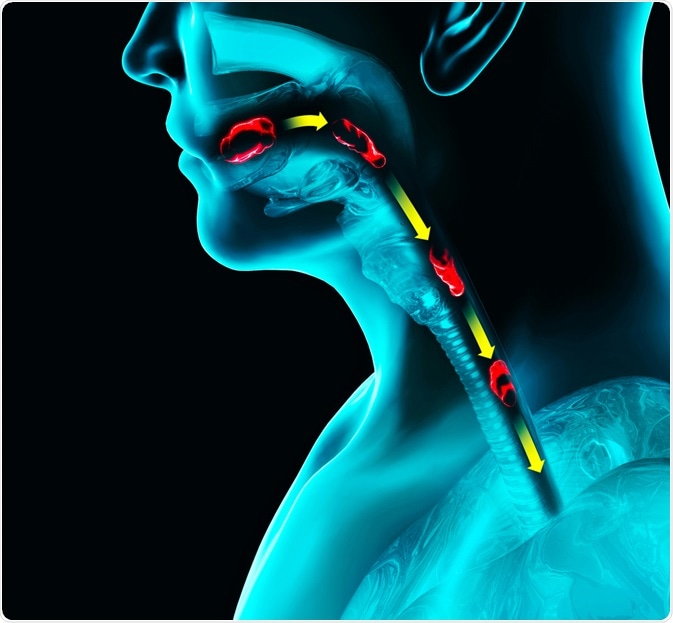Dysphagia is the medical term used to refer to difficulty swallowing. The condition makes it difficult for people to pass solid or liquid food from the mouth to the stomach.

Image Credit: Naeblys / Shutterstock.com
Dysphagia can compromise nutritional intake; therefore, affected individuals are at risk of malnourishment and dehydration. Some may even require hospitalization for life-threatening outcomes, such as aspiration pneumonia, which is a dangerous chest infection.
Dysphagia types
Dysphagia can be divided into two main forms including oropharyngeal dysphagia and esophageal dysphagia.
Oropharyngeal dysphagia refers to a problem involving the oral cavity, pharynx, or the sphincter at the top of the esophagus. Comparatively, esophageal dysphagia involves part of the esophagus, lower esophageal sphincter, or stomach.
Dysphagia by swallowing stage
Dysphagia can also be referred to in terms of which stage of the swallowing process is disrupted.
Oral phase dysphagia, for example, causes difficulty with chewing and moving the food into the throat area. Pharyngeal phase dysphagia causes difficulty with the swallowing reflex and squeezing food down into the larynx. The third stage by which dysphagia can affect swallowing is known as the esophageal phase. In the esophageal phase, the individual often exhibits difficulty in dilating and constricting the esophageal sphincter, which is necessary for food products that have been chewed to move through to the stomach.
Although dysphagia is a well-researched topic, the condition is still often misunderstood and misdiagnosed. In order for a diagnosis of dysphagia to be made, the patient’s symptoms must be related to swallowing a solid or liquid bolus.
If the problem is not related to this, globus hystericus may be indicated, which is different from dysphagia. Although globus hystricus may be a sign of a functional abnormality, it may also be caused by an abnormality in the musculature of the pharynx or esophagus.
What is Dysphagia (Difficulty Swallowing)?
Symptoms
While some people with dysphagia find they cannot swallow food or liquid, whereas others find they lose their ability to swallow altogether.
Some examples of the symptoms that can be observed in the two forms of dysphagia include:
Oropharyngeal dysphagia
- Coughing, gagging, or choking response when trying to eat or drink
- A feeling that food has become stuck in the larynx
- Drooling food or liquid from food stuck in the mouth
- Regurgitating food through the mouth or nose
- Repeatedly clearing the throat
- More time is needed to chew and swallow food
- Pain or discomfort on swallowing (odynophagia)
- Difficulty breathing while eating
- Inability to swallow
- Avoidance of eating in company
- Dehydration
- Weight loss
- Malnutrition
Esophageal dysphagia
- A sensation of food movement slowing or stopping beneath the breastbone
- Regurgitation of swallowed food
- Chest pain on swallowing
- Waking up at night with a cough
- Loss of appetite
- Weight loss
- Malnutrition
- Dehydration
Outcomes in adults and children
In adults, some of the signs of dysphagia can include malnourishment, dehydration, reduced enjoyment of mealtimes, and/or avoidance of eating and drinking in social situations.
In children, some signs can include:
- Tensing of the body when feeding
- Inattentiveness during mealtimes
- Refusal of foods with certain textures
- Requires an extensive amount of time to eat food
- Difficulty breastfeeding
- Drooling from the mouth while feeding
- Coughing or gagging when feeding
- Breathing difficulty
- Weight loss
- Delayed growth and development
- Recurring pneumonia
References
Further Reading
Last Updated: Apr 7, 2023